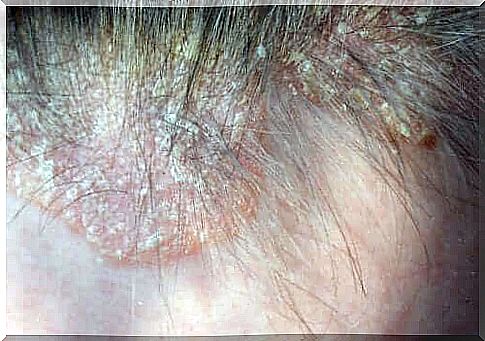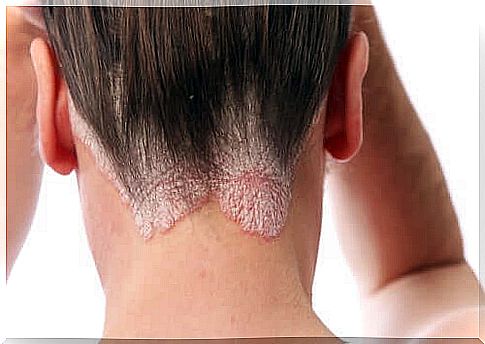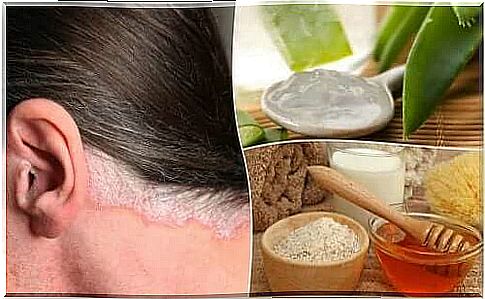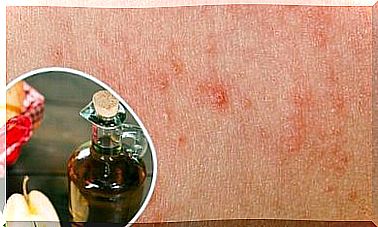Psoriasis Of The Head: Symptoms And Treatment

Some studies suggest that scalp psoriasis may be related to genetic factors.
Scalp psoriasis is a chronic, recurrent inflammatory skin disease. One of its features is the presence of delimited erythematous lesions with white flaky pieces of skin. Dermal scales are usually found inside the limbs bends and on the scalp.
It is a disease of considerable clinical variability. It is for this reason that its development depends on many factors.
Psoriasis of the head and its causes – genetic and immunological factors
Some studies have shown a high incidence of psoriasis in relatives of patients. However, the development of cellular immunology suggests the involvement of leukocytes in the pathogenesis of this disease.
Environmental factors

There are several factors that contribute to a sudden onset of psoriasis, especially in people with a genetic predisposition. We include among them:
- Emotional stress,
- Low humidity environment,
- Taking certain medications / pharmaceuticals,
- Smoking and obesity.
In addition, psoriasis changes may appear in the event of any skin irritation. Conversely, additional stimulation, such as scratching or putting pressure on the clothes, can induce changes or worsen existing damage.
Medicines / Pharmaceuticals
Drugs that can cause or worsen psoriasis include lithium salts, beta-blockers, anti-malarial drugs, and abrupt cessation of corticosteroid therapy.
Obesity and smoking
Being overweight is another important factor to consider. It turns out that overweight and psoriasis have a two-way relationship, because excess weight increases the risk of developing psoriasis, and psoriasis increases the risk of developing excess weight. In addition, chronic smoking interferes with numerous inflammatory processes, including the immune response.
Infectious agents
There is a link between an infection with group A beta-hemolytic streptococci and the first attack of psoriasis. This is especially true when the attack occurs in the oropharynx.
Symptoms of scalp psoriasis
This condition can manifest itself in many ways. There are many and varied symptoms that can affect even one patient.
In appearance, it can resemble both a rash and scaly spots. However, it does not usually lead to hair loss. Most often it appears on the back of the head and forehead.
The characteristic symptoms are not pruritus. However, scratching the lesions can lead to bleeding. The diagnosis of scalp psoriasis is based on the presence of scaly erythematous lesions.
The dermatologist uses morphological criteria to assess the severity of psoriasis. This is especially true of the area with psoriasis and its severity index. The latter value helps measure the extent of psoriasis lesions, and the level of erythema and scale development.
Treatment of scalp psoriasis

Psoriasis of the head is a chronic disease, therefore its treatment is mainly aimed at controlling its severity. However, scales in the affected area are common and difficult to treat.
Topical treatment
At the outset, it should be emphasized that topical treatment is the basis for the treatment of this glide. The classic therapy consists of:
- The use of emollients in conjunction with pharmacological treatment. They also help to maintain adequate hydration and a good condition of the corneal layer of the skin. This group includes 20% urea, petroleum jelly and glycerin.
- In addition, keratolytic agents are used to eliminate acute skin lesions. In addition, these agents also aid the absorption of other topical medications. For example, salicylic acid is often found in the composition of shampoos and hair oils. Other keratolytic agents that can be found in cosmetics are urea strength 10-30, salicylic, lactic and glycolic acids, sulfur and Keluamide.
- In addition, the carbon pitch reduces the thickness of the epidermis. It is often prescribed to children and people with stable plaques. However, it can increase irritation, although it is not necessarily toxic.
- It is also worth mentioning that in mild cases, topical corticosteroids are used first. This is because they have anti-inflammatory and immunosuppressive effects.
Systemic treatment of scalp psoriasis
Dermatologists use them in patients who are not successful with topical treatment. Therefore, they prescribe the following drugs:
- Methotrexate, a drug used in moderate to severe psoriasis.
- Ciclosporin, an immunosuppressant drug that inhibits the production of T-cell dependent antibodies.
- Acitretin, a vitamin A derivative that inhibits the development of psoriasis, even in the presence of keratolytic disorders.









